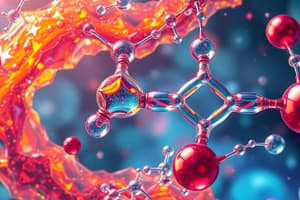Podcast
Questions and Answers
What is the bond angle of alkenes?
What is the bond angle of alkenes?
- 180°
- 120° (correct)
- 90°
- 150°
What is a characteristic of alkynes?
What is a characteristic of alkynes?
- They have a C-H bond
- They have a single bond between carbon atoms
- They have a low energy double bond
- They have a high energy triple bond (correct)
What can alkynes undergo to form alkenes?
What can alkynes undergo to form alkenes?
- Electrophilic addition
- Reduction
- Oxidative cleavage
- Hydrogenation (correct)
What type of reaction do alkenes undergo with electrophiles?
What type of reaction do alkenes undergo with electrophiles?
What is a difference in reactivity between alkynes and alkenes?
What is a difference in reactivity between alkynes and alkenes?
What is the product of the oxidative cleavage of an alkyne?
What is the product of the oxidative cleavage of an alkyne?
What is the main reason for the increase in boiling points as the chain length of alkanes increases?
What is the main reason for the increase in boiling points as the chain length of alkanes increases?
What is the approximate increase in boiling point for each additional CH2 group in an alkane chain?
What is the approximate increase in boiling point for each additional CH2 group in an alkane chain?
Why do branched alkanes have lower boiling points than unbranched alkanes?
Why do branched alkanes have lower boiling points than unbranched alkanes?
What is the boiling point of pentane (C5H12)?
What is the boiling point of pentane (C5H12)?
Why do alkenes have lower boiling points than alkanes?
Why do alkenes have lower boiling points than alkanes?
Flashcards are hidden until you start studying
Study Notes
Molecular Structure
- Alkynes:
- Contain a carbon-carbon triple bond (C≡C)
- Bond angle: 180° (linear shape)
- Examples: ethyne (acetylene), propyne
- Alkenes:
- Contain a carbon-carbon double bond (C=C)
- Bond angle: 120° (planar, trigonal shape)
- Examples: ethene (ethylene), propene
Reactivity
- Alkynes:
- Highly reactive due to the high energy of the triple bond
- React with electrophiles (e.g., HCl, Br2) to form addition products
- Can undergo hydrogenation to form alkenes
- Can undergo oxidative cleavage to form carboxylic acids
- Alkenes:
- Less reactive than alkynes, but still reactive
- React with electrophiles (e.g., HCl, Br2) to form addition products
- Can undergo hydrogenation to form alkanes
- Can undergo electrophilic addition reactions (e.g., Markovnikov's rule)
Note: These notes provide a brief overview of the molecular structure and reactivity of alkynes and alkenes. For a more in-depth understanding, additional study and review are recommended.
Molecular Structure
- Alkynes have a carbon-carbon triple bond (C≡C) and a linear shape with a 180° bond angle
- Examples of alkynes include ethyne (acetylene) and propyne
- Alkenes have a carbon-carbon double bond (C=C) and a planar, trigonal shape with a 120° bond angle
- Examples of alkenes include ethene (ethylene) and propene
Reactivity
- Alkynes are highly reactive due to the high energy of the triple bond
- Alkynes react with electrophiles (e.g., HCl, Br2) to form addition products
- Alkynes can undergo hydrogenation to form alkenes
- Alkynes can undergo oxidative cleavage to form carboxylic acids
- Alkenes are less reactive than alkynes, but still reactive
- Alkenes react with electrophiles (e.g., HCl, Br2) to form addition products
- Alkenes can undergo hydrogenation to form alkanes
- Alkenes can undergo electrophilic addition reactions (e.g., Markovnikov's rule)
Factors Affecting Boiling Points
- Chain length increases boiling points due to increased intermolecular forces.
- Branching decreases boiling points due to reduced intermolecular forces.
- Boiling points increase with increasing molecular mass.
Boiling Point Trends
- Boiling points increase as the number of carbon atoms in the alkane chain increases.
- The boiling point increases by approximately 20-30°C for each additional CH2 group.
Boiling Points of Selected Alkanes
- Methane (CH4): -161.5°C
- Ethane (C2H6): -88.5°C
- Propane (C3H8): -42.2°C
- Butane (C4H10): -1°C
- Pentane (C5H12): 36.3°C
- Hexane (C6H14): 68.7°C
Comparison with Other Hydrocarbons
- Alkenes and alkynes have lower boiling points than alkanes due to weaker intermolecular forces.
- Cycloalkanes have higher boiling points than alkanes due to stronger intermolecular forces.
Studying That Suits You
Use AI to generate personalized quizzes and flashcards to suit your learning preferences.



